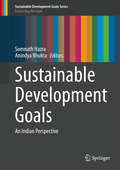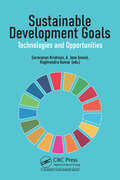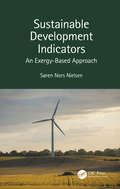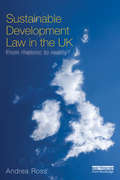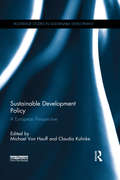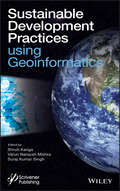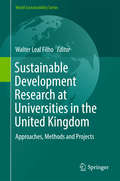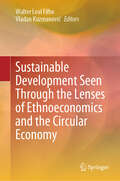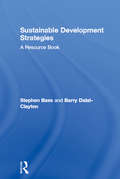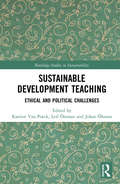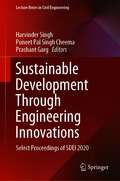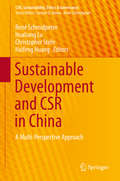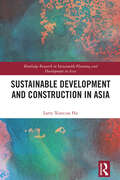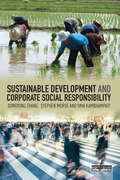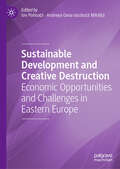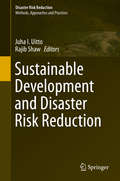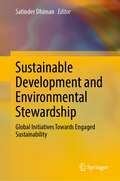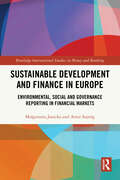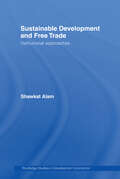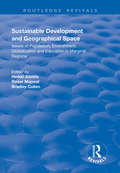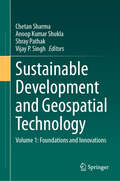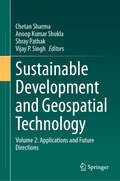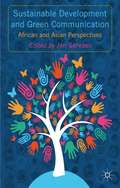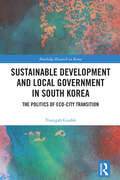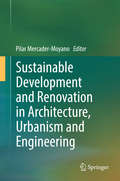- Table View
- List View
Sustainable Development Goals: An Indian Perspective (Sustainable Development Goals Series)
by Somnath Hazra Anindya BhuktaThis volume examines the practicality of achieving the UN Sustainable Development Goals in India, and includes policy analyses and statistical assessments of comparative data between India and different countries. With a focus on poverty and economics, the contributors offer sector and state specific performance analyses of each goal, determining the feasibility for different states and regions to implement a given goal under conditions of extreme poverty and economic distress. Readers will learn how to perform comprehensive economic performance analyses, and how to apply these methods at local and regional scales within the framework of sustainable development. The book will be of interest to students and researchers studying sustainable development, economics, and policy analysis, as well as NGOs and government agencies working towards achieving the SDGs in impoverished nations.
Sustainable Development Goals: Technologies and Opportunities
by Raghvendra Kumar Saravanan Krishnan A. Jose AnandSustainable Development Goals (SDGs) are goals set by the United Nations to address the global challenges and foster sustainable development and harmony. To effectively achieve these goals, leveraging advanced technologies and engineering techniques is paramount. This edited volume explores the pivotal role of technology and engineering in advancing the SDGs across various sectors such as green energy, water management, healthcare, agriculture, and smart manufacturing. From innovative solutions in clean energy production to precision agriculture and smart cities, technological advancements offer scalable and efficient approaches to tackle complex sustainability issues.
Sustainable Development Indicators: An Exergy-Based Approach (Applied Ecology and Environmental Management)
by Søren Nors NielsenAnalyzing the self-sufficient Danish island of Samsø, this book explains sustainability through a bio-geophysical understanding of how to best use society’s limited resources to achieve true sustainability. The method used derives from the thermodynamic function of exergy. By analyzing exergy flows and establishing a system for evaluating the energy and the materials used in a society, the author creates a platform for monitoring certain indicators of sustainability. These indicators inform readers about the actions that must be taken and the time frames for achieving sustainability goals. The exergy-based approach is an important tool for carrying out such an analysis because it Focuses on several key thermodynamic concepts and the usefulness of exergy analysis for evaluating sustainability Explains sustainability by implementing thermodynamic laws to societal consumption and the use of resources Discusses new methods that integrate energy and material fluxes and evaluates them against each other Provides direct indicators for finding the largest problems/obstacles and deciding where measures should be taken Includes instructions on how to establish an accounting system for evaluating the energy and the materials used in a society This book is aimed for professionals, researchers, and students working on nature conservation and environmental management projects related to sustainability.
Sustainable Development Law in the UK: From Rhetoric to Reality?
by Andrea RossSustainable development is now widely accepted as a political objective in the UK and elsewhere but to what extent has the UK’s rhetoric on sustainable development become a reality? The aim of this book is to critically examine the UK’s approach to promoting and delivering sustainable development. It begins by providing a detailed account of UK law on sustainable development by reviewing the various policy, institutional and legal mechanisms used by the UK since the 1980s and by devolved administrations since devolution took effect in 1999. Progress has been slow, too slow and, according to the scientists, time is running out. To deal with this lack of progress, the book advocates increasing the status of ecological sustainability and sustainable development through the introduction of a wide range of legal mechanisms which would compel the change needed. The book calls for ecological sustainability, or respecting the Earth’s environmental limits, to be afforded the status of legal principle and argues that with ecological sustainability at its normative core, sustainable development could provide an effective framework for decision making and governance. It argues that to support this approach and ensure consistency, the time has come for sustainable development to receive explicit legal backing. Over and above its symbolic and educational value, legislation can impose mandatory rules on policymakers and decision makers, often with meaningful consequences both inside and outside the courtroom. To this end, the book contributes to the theory on sustainable development governance by suggesting three possible legislative approaches for such intervention. The volume concludes that while a lack of leadership on sustainable development may hinder the introduction of these innovations, once introduced, these innovations would equally provide much needed support for effective leadership towards a sustainable future. Andrea Ross is a Reader in the School of Law at the University of Dundee and has taught and researched in the areas of public and environmental law for over 18 years. Before becoming an academic she qualified as a Barrister and Solicitor in Ontario, Canada.An Earthscan from Routledge book.
Sustainable Development Policy: A European Perspective (Routledge Studies in Sustainable Development)
by Michael Von Hauff Claudia KuhnkeSustainable Development Policy: A European Perspective uses a variety of multidisciplinary perspectives to explore the ways in which sustainable infrastructures can play a more prominent and effective role in international development policy. Building on a solid introduction to sustainability and development policy, this book discusses ways in which viable reform can be promoted through coherent governing, the design of social security systems, education systems and the possibilities of fair trade as an alternative trading concept . Sustainable Development Policy generates a platform on which to encourage constructive dialogue on issues surrounding sustainability in the wake of the global scarcity of natural and economic resources. This edited collection will be of great interest to all students and lecturers of development studies and development policy, as well as researchers from other disciplines looking for an introduction to sustainable development policy and its practical applications.
Sustainable Development Practices Using Geoinformatics
by Shruti Kanga Varun Narayan Mishra Suraj Kumar SinghOver the last few years, the stress on natural resources has increased enormously due to anthropogenic activities especially through urbanization and industrialization processes. Sustainable development while protecting the Earth’s environment involves the best possible management of natural resources, subject to the availability of reliable, accurate and timely information on regional and global scales. There is an increasing demand for an interdisciplinary approach and sound knowledge on each specific resource, as well as on the ecological and socio-economic perspectives related to their use. Geoinformatics, including Remote Sensing (RS), Geographical Information System (GIS), and Global Positioning System (GPS), is a groundbreaking and advanced technology for acquiring information required for natural resource management and addressing the concerns related to sustainable development. It offers a powerful and proficient tool for mapping, monitoring, modeling, and management of natural resources. There is, however, a lack of studies in understanding the core science and research elements of geoinformatics, as well as larger issues of scaling to use geoinformatics in sustainable development and management practices of natural resources. There is also a fundamental gap between the theoretical concepts and the operational use of these advance techniques. “Sustainable Development Practices Using Geoinformatics” written by well-known academicians, experts and researchers provides answers to these problems, offering the engineer, scientist, or student the most thorough, comprehensive, and practical coverage of this subject available today, a must-have for any library.
Sustainable Development Research at Universities in the United Kingdom
by Walter Leal FilhoThis book gathers inputs from a variety of researchers in the field of sustainable development in the widest sense across the UK, from business and economics, to arts and fashion, administration, environment and media studies. The book also describes research, curriculum innovation, and campus greening in a comprehensive way. Many universities in the United Kingdom are currently engaged in high-quality research on matters related to sustainable development. Yet there are relatively few publications that provide a multidisciplinary overview of these efforts and projects, and in which researchers from across the spectrum of the natural and social sciences have the opportunity to present their research methods, the results of their empirical research, or exchange ideas about on-going and future research initiatives focusing on sustainable development. Addressing this important gap in the literature, this book contributes to the further development of this rapidly growing field in the United Kingdom and beyond.
Sustainable Development Seen Through the Lenses of Ethnoeconomics and the Circular Economy
by Walter Leal Filho Vladan KuzmanovićThis book introduces ethnoeconomics, explaining how cultural, social, and historical factors influence economic behavior and decision-making. The book also delves into the principles of the circular economy, emphasizing the importance of designing out waste, keeping products and materials in use, and regenerating natural systems. It explores how these principles can contribute to sustainable economic growth and resilience. The book also explores how insights from ethnoeconomics can inform and enhance the implementation of circular economy principles, with case studies and theoretical frameworks that showcase the benefits of this integration for sustainable development.
Sustainable Development Strategies: A Resource Book
by Barry Dalal-Clayton Stephen BassThis book is a cornerstone resource for a wide range of organizations and individuals concerned with sustainable development at national or local levels, as well as for international organizations concerned with supporting such development. Whilst the focus is on integrated strategies for sustainable development, the approaches and methods covered are equally relevant to poverty reduction, environmental and sectoral strategies, programme development and review. Agenda 21 called for all countries to develop sustainable development strategies. For such strategies to be effective there needs to be a real commitment. In every country, government at all levels, the private sector, and civil society, must work together in a true partnership, in transparent ways which enable genuine stakeholder participation. The necessary mechanisms and processes need to be coordinated to enable continuous learning and improvement. This resource book provides flexible, non-prescriptive guidance on how to develop, assess and implement national sustainable development strategies. It sets out principles and ideas on process and methods, and suggests how these can be used. It is based on an analysis of past and current practice, drawing directly from experience in both developed and developing countries. Following a discussion of the nature and challenges of sustainable development and the need for strategic responses to them, the heart of the book covers the main tasks in strategy processes. Individual chapters offer a rich range of guidance, ideas and case studies.
Sustainable Development Teaching: Ethical and Political Challenges (Routledge Studies in Sustainability)
by Leif Östman Katrien Van Poeck Johan ÖhmanThe aim of this book is to support and inspire teachers to contribute to much-needed processes of sustainable development and to develop teaching practices and professional identities that allow them to cope with the specificity of sustainability issues and, in particular, with the teaching challenges related to the ethical and political dimension of environmental and sustainability education. Bringing together recent scholarship on the topic, this book translates state-of-the-art academic research into teaching models, methods and tools. Starting with an outline of the challenge of sustainability, it offers insights and models for understanding the interesting yet ambiguous concept of ‘sustainable development’ and the complex process of transforming society in a more sustainable direction (Part I). It then goes on to provide a guide to preparing courses and lessons as well as tools for reflection about teaching practices and the multiplicity of approaches to addressing ethical and political challenges in sustainable development teaching (Part II). Finally, the book offers useful conceptual frameworks, models and typologies about the concrete design and implementation of sustainable development teaching (Part III). This book will be essential reading for students of education, as well as teachers in compulsory and higher education and sustainability education researchers.
Sustainable Development Through Engineering Innovations: Select Proceedings of SDEI 2020 (Lecture Notes in Civil Engineering #113)
by Harvinder Singh Prashant Garg Puneet Pal Singh CheemaThis book comprises select peer-reviewed papers presented at the International Conference on Sustainable Development through Engineering Innovations (SDEI) 2020. It presents recent advances, new directions, and opportunities for sustainable and resilient approaches to design and protect the built-environment through engineering innovations & interventions. The topics covered are highly diverse and include all civil engineering and construction-related aspects such as construction and environmental Issues, durability and survivability under extreme conditions, design of new materials for sustainability, eco-efficient and ultra-high performance cementitious materials, embedded structural and foundation systems and environmental geomechanics. The book will be of potential interest to the researchers and students in the fields of civil engineering, architecture and sustainable development.
Sustainable Development and CSR in China
by René Schmidpeter Hualiang Lu Christopher Stehr Haifeng HuangThis book offers an in-depth analysis of Corporate Social Responsibility, gathering contributions by authors from various countries, cultures and political systems. It provides readers with a better understanding of the concept and its implementation in China by pursuing an international approach. The respective contributions examine Corporate Social Responsibility in terms of its close ties to ecology, corporate sustainability and the future of specific industries. The book is the product of two international meetings, the "Ecological Education and Sustainable Development Forum" in Chengdu, China, and the "CSR & Business Sustainability Development Forum" in Shenzen, China.
Sustainable Development and Construction in Asia (Routledge Research in Sustainable Planning and Development in Asia)
by Larry Xiancun HuThis book illuminates fundamental knowledge and provides a comprehensive guide for those seeking to understand the intricacies of sustainable development and construction in Asia. Each chapter is dedicated to a specific aspect of sustainable construction, offering in-depth analysis, case studies, and practical insights.The main characteristic of this book is a comprehensive exploration and integration of research, practices, and innovations, emphasizing the importance of academic research and practical implementations in driving sustainable construction. The advanced project management methods towards sustainable construction are explained, including life cycle management, sustainable procurement, risk management, lean construction, and integrated project delivery. Smart construction technologies are illustrated, for example, 3D printing, BIM (building information modelling), industrialized, prefabricated, and digital technologies like eXtended reality, machine learning, digital twins, big data, blockchain, Internet of Things, and cloud construction technologies. Particularly, the relationships and differences among off-site, industrialized, prefabricated, modular, panelized, and hybrid construction are displayed. Finally, practical on-site construction techniques and valuable sustainable construction materials are demonstrated in shaping sustainable practices.This book will be of interest to practitioners, researchers, and consultants in the general field of sustainable development in construction.
Sustainable Development and Corporate Social Responsibility
by Stephen Morse Dongyong Zhang Uma KambhampatiCorporate Social Responsibility (CSR) has become an important concept in the last few decades. Although it originated in the developed countries of the West, the concept has been embraced and adapted by corporations and policy-making agencies in many developing countries. Not surprisingly, given the importance of growth and development as policy objectives in these countries, CSR has had a significant impact on sustainable development. Sustainable Development and Corporate Social Responsibility explores the evolution of CSR across the developed and developing world, with a particular focus on China and sustainable development. Through an extensive review of the literature and relevant case studies, the book examines whether CSR can make a contribution to sustainable development, how the patterns of CSR in developed Western economies compare to that in the rapidly growing economy of China, what trade-offs take place between CSR and economic growth as well as the future of CSR and its possible impact on the global sustainable development agenda. This book is a valuable resource for academics and upper-level undergraduate and postgraduate students in the fields of human/social geography, economics, business studies, sustainable development, development studies and environmental studies.
Sustainable Development and Creative Destruction: Economic Opportunities and Challenges in Eastern Europe
by Ion Pohoaţă Andreea Oana Iacobuţă MihăiţăThis book explores sustainable development from the perspective of the post-communist experience of Eastern Europe. Taking into account the specific characteristics of different countries within Eastern Europe, the contrast between economic theory and practice is highlighted. An understanding of the economic development of the Eastern Europe is presented to provide insights into the challenges, in particular the juxtaposition of new and old traditions, and opportunities for sustainable development in this area. This book highlights how the implementation of sustainable development policies is dependent on culture, institutions, history, and geography. It will be relevant to students and researchers interested in environmental economics and the economic development of Eastern Europe.
Sustainable Development and Disaster Risk Reduction
by Rajib Shaw Juha I. UittoThis book focuses on exploring the linkages between natural disasters and sustainable development at the global, regional, and national levels. Disasters and development are closely related, yet the disciplinary silos prevail and there is little communication and cooperation between the disaster management, environment, and development communities. One catastrophic event, such as an earthquake, tsunami, or cyclone, can destroy infrastructure, people's lives and livelihoods, and set back development. Similarly, slow onset disasters--often associated with global climate change--pose threats to development, livelihoods, food security, and long-term sustainable development. This book is uniquely aimed at bridging the gaps between the environmental, development, and disaster management communities. It traces the evolution of concepts and practice and highlights the linkages between natural disasters and sustainable development in key sectors, including food security, health, and water. The book includes case studies from the field highlighting the complex issues that challenge sustainable development and disaster risk management in practice. It draws policy conclusions for the global community based on state-of-the art knowledge from research and practice. The primary target groups for the book are researchers, including graduate students, in the fields of environment and sustainable development, geography, disaster risk reduction, and climate change studies. The second target group comprises practitioners and policymakers working in national and international organizations, the private sector, and civil society.
Sustainable Development and Environmental Stewardship: Global Initiatives Towards Engaged Sustainability
by Satinder DhimanThis book builds on recent advances in the theory of sustainable development and links it with environmental stewardship in a dialectical manner, as envisioned by global scholars in this emerging field. Environmental stewardship deals with practical issues of ecosystem management and governance to address changes in socio-ecological systems to sustain the supply and availability of ecosystem services by society. It means reducing our total footprint on the planet, not just carbon footprint. Truly global in scope, this volume is a humble offering of more than 12 scholars and practitioners from around the world to the exciting adventure of sustainable development and eco-stewardship. Featuring topics such as climate change, organizational sustainability, green innovation, and urban governance, this book is useful for policy makers, managers of NGOs, and sustainability researchers in developing engaging strategies for a more sustainable planet.
Sustainable Development and Finance in Europe: Environmental, Social and Governance Reporting in Financial Markets (Routledge International Studies in Money and Banking)
by Małgorzata Janicka Artur SajnógSustainable development is a major challenge of our times. The conditions necessary for sustainable transformation cut across all economic entities and sectors that operate on macro- and micro-economic scales, both nationally and internationally. The subject of sustainability has been represented in the public space for years, but there are few studies available on the practical implementation of the related goals and most publications focus on the issues of “green” finance and the environment. A particularly large information gap relates to the role of sustainable finance in achieving sustainable development, which has been underestimated for years. This book characterizes and evaluates how stock markets operate in European Union (EU) countries in terms of the sustainable development of public companies.The book addresses two key research areas. Firstly, it provides an analysis of the legal and institutional environment of the EU stock markets in the sustainable reconstruction of the European economy and secondly, it assesses the conditions for EU public companies to implement environmental, social, and governance (ESG) non-financial reporting requirements, and how the ESG indicators, based on these, function. The book presents the methodology for constructing ESG indicators, with particular emphasis on Refinitiv, which is one of the largest databases in this area and the most recognizable on a global scale.The book is a valuable source of knowledge on the conditions and consequences of changes in the financial markets, especially the stock markets and is addressed primarily to the academic community but may also be informative, engaging, and useful for various stakeholders in the business sector, including enterprises, institutional and individual investors, and financial institutions.
Sustainable Development and Free Trade: Institutional Approaches (Routledge Studies In Development Economics Ser.)
by Shawkat AlamExamining institutions rather than themes, this critical book provides a comprehensive survey of the inter-relationship between trade-induced economic growth and the environment and its impact on the global quest for sustainable development. Focusing in particular on the interests and concerns of developing countries and the skewing of internationa
Sustainable Development and Geographical Space: Issues of Population, Environment, Globalization and Education in Marginal Regions (Routledge Revivals)
by Heikki Jussila Roser MajoralThis title was first published in 2002: While world-wide political, sociological and economic processes encourage the marginalization of peripheral areas, the general degradation of the ecosystem increasingly affects marginal populations as they are more likely to use natural resources. The fact that these communities suffer greatly from environmental, economic and social problems also tends to prevent them adopting a sustainable use of these local resources. Using a series of international case studies from both developed and developing countries, this remarkable volume explores issues of sustainable development in marginalized regions of the world. It discusses population development and sustainability, as well as environment and sustainability, from the point of view of regional development. It also examines globalization and the role of education in encouraging a sustainable path of development. A common focus shared by the contributors is that of the human aspects of development, as well as the concept of sustainability and its usefulness in geographical and economic research. The volume provides an insightful overview of the issues that touch sustainability in marginal and critical regions.
Sustainable Development and Geospatial Technology: Volume 1: Foundations and Innovations
by Vijay P. Singh Chetan Sharma Anoop Kumar Shukla Shray PathakThis two-volume set showcases the various ways in which geospatial technology can be used to achieve sustainable development goals across different sectors such as urban planning, natural resource management, agriculture, disaster management, and energy management. The books provide insights into the potential of geospatial technology in promoting sustainable development practices and addressing challenges related to climate change, environmental degradation, and socio-economic development. Both volumes together are a comprehensive guide that showcases the potential of geospatial technology in promoting sustainable development practices across different sectors, and will serve as an essential resource for professionals, policymakers, researchers, and students interested in sustainable development and geospatial technology. Volume 1 introduces the intertwined realms of sustainable development and geospatial technology. It navigates readers through the fundamental principles of sustainable development, exploring its goals and the pivotal role geospatial technology plays in its realization. Beginning with an overview of these critical concepts, it subsequently dives into the core foundations of geospatial technology, covering Geographic Information Systems (GIS), remote sensing, spatial data analysis, and data visualization. The volume also encompasses the practical aspects of sustainable urban planning, natural resource management, and transportation planning using GIS, underpinning the relevance of geospatial technology in addressing contemporary global challenges.
Sustainable Development and Geospatial Technology: Volume 2: Applications and Future Directions
by Vijay P. Singh Chetan Sharma Anoop Kumar Shukla Shray PathakThis two-volume set showcases the various ways in which geospatial technology can be used to achieve sustainable development goals across different sectors such as urban planning, natural resource management, agriculture, disaster management, and energy management. The books provide insights into the potential of geospatial technology in promoting sustainable development practices and addressing challenges related to climate change, environmental degradation, and socio-economic development. Both volumes together are a comprehensive guide that showcases the potential of geospatial technology in promoting sustainable development practices across different sectors, and will serve as an essential resource for professionals, policymakers, researchers, and students interested in sustainable development and geospatial technology.Volume 2 explores practical applications, insightful case studies, and emerging trends within the dynamic intersection of sustainable development and geospatial technology. Delving into the critical domain of water resources and agriculture, it scrutinizes the application of geospatial tools in river basin management, integrated water resources management (IWRM), sustainable agriculture, and precision agriculture. The volume then shifts its focus to disaster management, energy, and the future, encompassing geospatial data science for disaster resilience, Earth observation for sustainable energy management, and diverse case studies that highlight the impact of geospatial technology on sustainable development. Moreover, it ventures into environmental monitoring and analysis, discussing topics like land use planning, climate change mitigation, environmental monitoring technology, and socioeconomic inequalities.
Sustainable Development and Green Communication
by Jan ServaesOffering a comprehensive overview of contemporary theoretical and programmatic issues in the fields of sustainability, culture, communication, development and social change, this book explores the relationship between communication and sustainability from a social change perspective.
Sustainable Development and Local Government in South Korea: The Politics of Eco-city Transition (Routledge Research on Korea)
by Youngah GuahkThis book addresses one of the key issues of our time, the process of sustainable transition in modern, industrial societies, by looking at the dynamics associated with this objective at the decentralised local level in South Korea.The creation of eco-cities is a crucial aspect in the ongoing urbanisation of East Asia, and this book investigates specific examples of Korean local governments embarking on the path towards sustainable urban development and assesses their achievements. Making use of a wide range of sources and data collection methods, the book studies two diverse cases in great depth: Suwon City and Jeju Province. By systematically comparing the aims, strategies and decision-making processes in these two examples, the book illuminates the relative roles played by local leaders, central government, civil society representatives, and even international organisations.Highlighting the challenges, driving forces and limitations impacting sustainable transition at the local level, this book will be a valuable resource to students and scholars of Korean politics, decentralisation, urban governance, sustainable development and city planning.
Sustainable Development and Renovation in Architecture, Urbanism and Engineering
by Pilar Mercader-MoyanoThis book provides an overview of the environmental problems that arise from construction activity, focusing on refurbishment as an alternative to the current crisis in the construction sector, as well as on measures designed to minimize the effects on the environment. Furthermore, it offers professionals insights into alternative eco-efficient solutions using new materials to minimize environmental impacts and offers solutions that they can incorporate into their own designs and buildings. It also demonstrates best practices in the cooperation between various universities in Andalusia in Spain and Latin America and many public and private companies and organizations. This book serves as a valuable reference resource for professionals and researchers and provides an overview on the status of investigations to find solutions to improve sustainable development in terms of materials, systems, facilities, neighborhoods, buildings, and awareness of the society involved.
